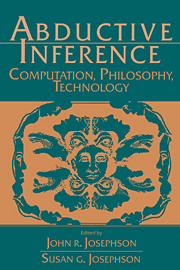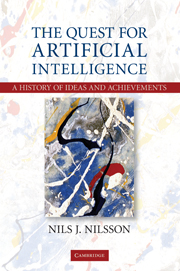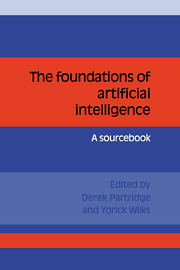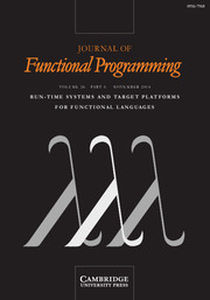Abductive Inference
Computation, Philosophy, Technology
$58.99 USD
- Editors:
- John R. Josephson, Ohio State University
- Susan G. Josephson, Ohio State University
- Date Published: February 2011
- availability: This ISBN is for an eBook version which is distributed on our behalf by a third party.
- format: Adobe eBook Reader
- isbn: 9780511882524
Find out more about Cambridge eBooks
$
58.99 USD
Adobe eBook Reader
Other available formats:
Paperback, Hardback
Looking for an inspection copy?
This title is not currently available on inspection
-
This book is about abduction, 'the logic of Sherlock Holmes', and about how some kinds of abductive reasoning can be programmed in a computer. The work brings together Artificial Intelligence and philosophy of science and is rich with implications for other areas such as, psychology, medical informatics, and linguistics. It also has subtle implications for evidence evaluation in areas such as accident investigation, confirmation of scientific theories, law, diagnosis, and financial auditing. The book is about certainty and the logico-computational foundations of knowledge; it is about inference in perception, reasoning strategies, and building expert systems.
Read more- Analyses abduction as an information-processing phenomenon
- The work brings together artificial intelligence and philosophy of science and is rich with implications for other areas
Reviews & endorsements
'This book is rich in detail and worthy of study either by those interested in the computational problems of abduction or by those interested in the transformation of philosophical questions about knowledge into 'technical questions about the performance of information-processing systems'. David Green, The Quarterly Journal of Experimental Psychology
See more reviews'The book provides a good general introduction to the effort of building abductive systems …'. Hilan Bensusan, AISB Quarterly
Customer reviews
Not yet reviewed
Be the first to review
Review was not posted due to profanity
×Product details
- Date Published: February 2011
- format: Adobe eBook Reader
- isbn: 9780511882524
- contains: 59 b/w illus.
- availability: This ISBN is for an eBook version which is distributed on our behalf by a third party.
Table of Contents
Introduction
1. Conceptual analysis of abduction: what is abduction?
2. Knowledge-based systems and the science of AI:
3. Two RED systems
4. Generalizing the control strategy
5. More kinds of knowledge: TIPS and PATHEX/LIVER TIPS
6. Better task analysis, better strategy
7. Computational complexity of abduction
8. Diagnostic systems MDX2 and QUADS
9. Practical abduction
10. Perception and language understanding
Appendices.
Sorry, this resource is locked
Please register or sign in to request access. If you are having problems accessing these resources please email [email protected]
Register Sign in» Proceed
You are now leaving the Cambridge University Press website. Your eBook purchase and download will be completed by our partner www.ebooks.com. Please see the permission section of the www.ebooks.com catalogue page for details of the print & copy limits on our eBooks.
Continue ×Are you sure you want to delete your account?
This cannot be undone.
Thank you for your feedback which will help us improve our service.
If you requested a response, we will make sure to get back to you shortly.
×










